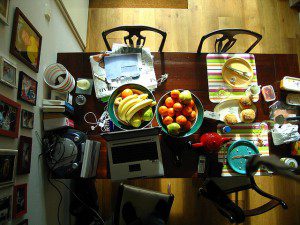 Following up on our post a couple days ago about fathers quitting work to spend time with their families, recently we ran into some interesting reflections on The Gospel Coalition’s website from Hannah Anderson for those who are wrestling with paycheck-less vocations. (Her thoughts come from her book Made for More: An Invitation to Live in God’s Image ):
Following up on our post a couple days ago about fathers quitting work to spend time with their families, recently we ran into some interesting reflections on The Gospel Coalition’s website from Hannah Anderson for those who are wrestling with paycheck-less vocations. (Her thoughts come from her book Made for More: An Invitation to Live in God’s Image ):
One day, shortly after transitioning from being an ESL instructor to being a stay-at-home mom, I was filling out one of those ubiquitous medicals forms at our doctor’s office. After listing my name, date of birth, address, and insurance info, I came to a field that had the option to either fill in my employer’s name or check a box that said “Don’t Work.” Having a strong commitment to intellectual honesty (and an even stronger philosophical disposition), I approached the receptionist to ask for clarification.
Instead she offered me a slightly puzzled look and then quickly replied, “Oh, you don’t work.”
Anyone who has been in a similar position understands how humbling, how demeaning this can feel. Whether you’re a stay-at-home mom or have ever been unemployed or underemployed, you know how these situations strike at your core sense of self. Just think about the ingenious ways stay-at-home moms describe their work in light of the marketplace by using terms like “domestic engineers” and “house managers.” It’s as if something about your very humanity is at stake, as if your identity as a productive human being is in question…..
.We struggle to understand what it means to work as image bearers, at least in part, because in Western society we tend to think of “work” in terms of receiving a paycheck for a specific job. But when we define “work” in terms of salary and position instead of in terms of gifting and service, we communicate that anyone who does not draw a salary or work in the marketplace is somehow less human. And we end up elevating those who work in professional positions above than those who work in more mundane callings.
If you’ve ever felt that way, Hannah has an excellent history of how we’ve come to think this, and what we can do about it:
God did not create the marketplace and the home to compete with each other but to depend on each other; and when we insist on pitting them against each other, we end up failing at both…We must recognize that imago dei work is larger than either that of the home or the marketplace, both encompassing and transcending them. And as image bearers, we rule over both. We do not enslave ourselves to cultural expectations of domesticity but rule over domesticity, using it to cultivate a place where every member—every image bearer—can flourish. Neither are we slaves to the marketplace, conforming to mechanistic structures of input and output….
You’ll want to read the whole post, and maybe check out her book, too. While the post and the book seem mainly aimed at women, the points are all very applicable to stay-at-home fathers and to unemployed and retired folks both male and female. There are also some links to other good resources on the topic over at TGC, and a fairly interesting discussion going on in the comments!
Image: Fabio Bruna, “The Office (at Home)”












